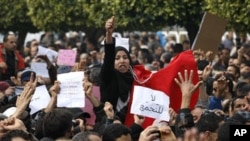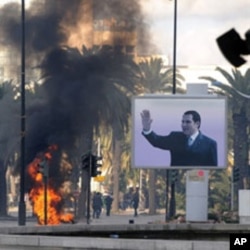Hundreds of anti-government protesters marched in the Tunisian capital calling for allies of the ousted president to leave the government.
Earlier in te week, Prime Minister Mohamed Ghannouchi announced a coalition government that included the current ministers of defense, interior, foreign affairs and finance. He announced lower-level cabinet positions for several opposition figures.
At least four opposition ministers have quit the unity government, aligning themselves with the anti-government protestesrs. Reporter Lisa Bryant has been out on the streets of Tunis. VOA's Paul Westpheling asked her to paint a verbal picture of what is happening there.
Westpheling: You have been on the main street in Tunis, the capital. What have you seen and what are people telling you about their hopes for the future?
Bryant: It’s a dual picture. Once again we have demonstrators on the main Habib Bourguiba Boulevard. This is where the main hotels are. It is where thousands thronged last Friday to protest against the government and it ended up ousting the ex-president [Zine El Abidine] Ben Ali. Now we have probably more like hundreds of protesters. They are asking for the RCD Party, the old ruling party, to leave. And that means pretty much most of the ministers in this new interim government, including the Prime Minister Mohamed Ghannouchi and the interim president, the former Speaker of Parliament, Fouad Mebazaa.
There’s also a new tone in this crowd which is they want the end of foreign interference. They were particularly condemning the United States and France. Tunisians can handle their problems on their own they were chanting - we don’t want any interference when it comes to elections, we can decide ourselves. That’s one side of it.
|
Zine El Abidine Ben Ali |
The other side of it is Tunis really is getting back to normal. This is a fragile normality I would say. You go down the streets, you see people in the coffee shops. I spent much of the morning before covering the demonstrations in a very poor neighborhood. This is a neighborhood where really the demonstrations were unleashed in Tunisia. Jobless youths, women and men who were just going around their ordinary routines, going to the market to buy vegetables. They are very very proud of what they’ve accomplished to date.
Westpheling: What about the police patrolling the streets and trying to maintain order?
Bryant: I have had colleagues who have had their cameras grabbed and temporarily confiscated. Actually, in this case our cameraman literally just arrived at the hotel and they confiscated the camera saying you do not have permission to film. You do not have permission to bring the camera in. [That[ is completely irrelevant right now because the interim prime minister announced Monday the complete freedom of the press.
Half of these organizations which are supposed to give us permission to film are closed because of the riots here. So it’s chaotic here. This is some of the old mentality that still is struggling. The police have confiscated the cameras of other cameramen. The police do crackdown against the demonstrators.
Yesterday, as usual, they broke up the demonstrations with tear gas. There’s also the army out in force, but actually the army is very well-viewed [well thought of] here and people say we need the army now to keep the peace.
Westpheling: Do there appear if there are any anti-anti-government protesters out, demanding that the old government be returned to power?
Bryant: No, no. I wonder where these people are. They must be there. Nobody I talked to on the street said they wished [former President] Ben Ali would come back. I did talk to a poor man today who said “we can’t have this chaos.” This is a young man; one of the men who helped unleash this revolt, or maybe, revolution. He said what we have now is terrible. The evening before Ben Ali fled the country [last Friday, 1-14-2011] amid massive protests around the country there was a pro Ben Ali demonstration after he had gone on TV and promised some reforms.
A friend of mine was here and said it was unreal. It seemed like it had been staged. I wonder where these people are today.
Westpheling: Can you explain how demonstrators were able to overthrow the government that ruled the country with an iron-fist for two decades?
Bryant: It’s absolutely shocking and surprising for me as well. I lived in Tunisia for two years as a Peace Corp volunteer. I was here when the first president was declared incompetent and too old when Ali took power. I remember this clearly and I remember coming back afterward as a journalist and interviewing people and they were too afraid to talk. Now, I’ve talked to Tunisian journalists, to people on the street, and everybody will talk to me. Sometimes people will grab the microphone. It’s like this pent-up anger and frustration. It’s all coming out. It’s absolutely mind-blowing to a certain extent.
Analysts will say: don’t be surprised. This has been bubbling in the background for the last few years and it was going to come out. But it is surprise because Tunisia does not have this reputation of being a revolutionary state. It’s not like an Algeria where there was a blood-bath in the 1990s. It is surprise but people say all the ingredients were there.
Reporter Lisa Bryant says she has not spoken to anyone on the streets, today, who is supportive of the fallen regime.





